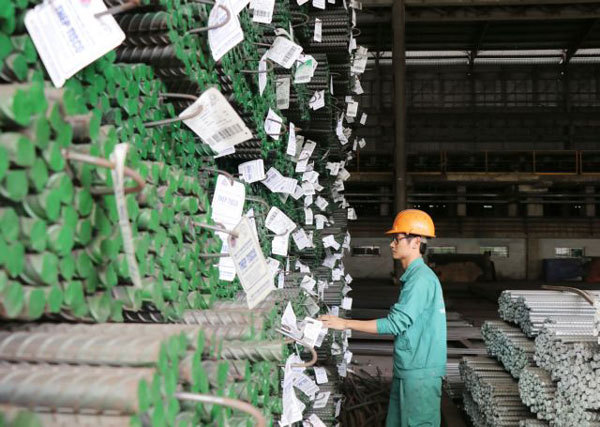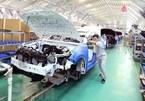 |
| A worker checks the newly rolled batches at Thai Nguyen Iron and Steel Company (TISCO). VNA/VNS Photo Hoang Nguyen |
The number of newly-established enterprises has increased considerably in the last few months. Do you have any projection on the health of these enterprises?
This is a positive sign for our business environment, thanks to the concerted efforts of all Government agencies, from the central to grassroots levels.
The business community has expressed confidence in the country’s business environment. This is a solid foundation for the establishment of many new enterprises.
The Government has paid special attention to improving the business environment; however the business community has not yet integrated successfully. Why is this?
Though the Government, ministries and sectors have done their best to support enterprises, their support is not enough for the enterprises and the community to operate effectively and sustainably while integrating into the global market.
Being a signatory to many Free Trade Agreements (FTA), Vietnam faces increasing competition with other nations, creating big pressure for each Vietnamese enterprise. In such a situation, the enterprises should understand that to secure a foothold in the international market, they have to do their best – both at home and internationally.
Do you mean our Vietnamese enterprises have to do more in the course of international integration?
A few Vietnamese enterprises have gained remarkable achievements in their course of international integration. However, the number of successful Vietnamese enterprises is still modest. This is food for thought for Vietnamese enterprises in the current tough international context.
Generally speaking, Vietnamese enterprises are still weak and they join the international market as a part in the assembly line in the international factory. The stage of “research and development” is still far away for us. In addition, the shortage of capital, technology and high-skilled human resources have become big hindrances for us in the course of international integration.
In addition, many Vietnamese enterprises have not prepared for the course of international integration. For example, now just about 27 per cent of Vietnamese enterprises have understood a little bit about the impacts of the Fourth Industrial Revolution and only 14 per cent of the enterprises have expressed their readiness to get involved in Industry 4.0.
We have to admit our skill in business management is still poor. Poor business management is one of the root causes of internal disputes. It will have negative impacts on the long term development of enterprises as well as attracting capital investment. Compared with our neighbouring countries, Vietnam’s ranking is very low. That means it will take us many years to catch up.
What should Vietnamese enterprises do to overcome these difficulties and challenges?
The first thing that each enterprise should do is define specific steps, particularly to produce higher value products in the global value chain. To achieve this goal, each enterprise has to raise their production capacity with much higher quality.
Adding to their short term objectives, the enterprises have also thought about the long term objectives, yet with specific goals. This is a weak point for Vietnamese enterprises as their business management skill ranking is at the bottom in ASEAN.
To gain a higher ranking in the global value chain, do you have any advice for the Government and enterprises?
The Government should exert further effort to speed up current reforms and give more support to enterprises, while speeding up the national economic growth rate in the remaining months of 2019.
However, to raise Vietnam’s competitiveness in the global value chain, what the country should do now is not only to overcome its weakness, but also to catch up. This is a big challenge for both the Government and enterprises. Of course it requires that both the Government and enterprises do their best.
On the Government side, it must make sure that all solutions on the restructuring of the national economy, institutional reforms and business environment improvement be strictly implemented
For the enterprises, they should focus efforts on raising their competitiveness ranking in both the national and international markets. - VNS

Vietnam’s auto industry needs breakthrough policies to close gap with regional peers
Without the presence of strong policies, Vietnam faces the risk of losing the majority share of domestic car markets to foreign players, said an expert.

Vietnamese retailers rise with the green trend
The competition in the Vietnamese retail market between domestic and foreign players goes beyond price, into the realm of customer experience and service quality as players are vying to offer green and fresh goods.

Vietnam’s agricultural sector to face fierce competition
Local firms are set to face fierce competition from EU imports thanks to two upcoming agreements between the two sides.
 Phan Duc Hieu, deputy director of the Central Institute for Economic Management, talks to Việt Nam News on the need to have strong co-operation between the Government and enterprises to succeed in the international market.
Phan Duc Hieu, deputy director of the Central Institute for Economic Management, talks to Việt Nam News on the need to have strong co-operation between the Government and enterprises to succeed in the international market.